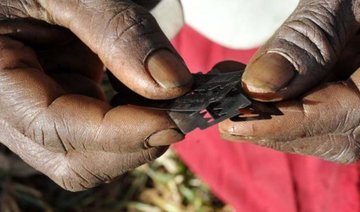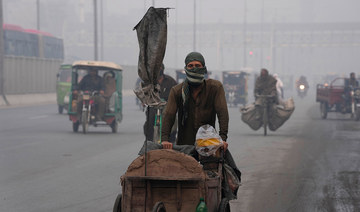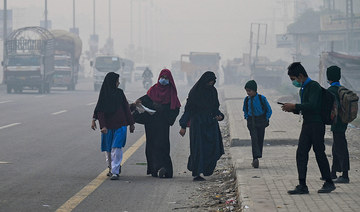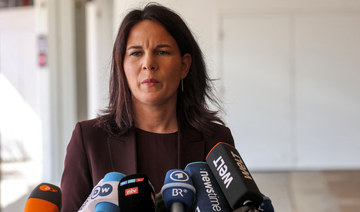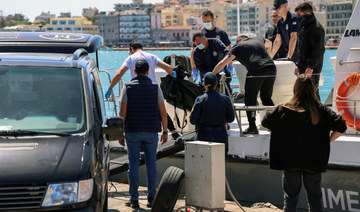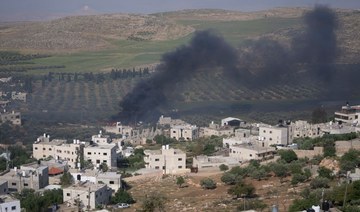DETROIT: Zehra Patwa learned only a few years ago that during a family trip to India at age 7, she was circumcized, which is common for girls in parts of Asia, Africa and the Middle East.
Patwa, 46, doesn’t remember undergoing the procedure, which is also called female genital mutilation or cutting and which has been condemned by the United Nations and outlawed in the US But she doesn’t want to.
“I have no desire to get that memory back. ... Psychologically, it feels like a violation, even though I don’t remember it,” said Patwa, a technology project manager from New Haven, Connecticut, who now campaigns against the centuries-old practice.
The recent arrest of a Michigan doctor accused of performing the procedure on two 7-year-old girls from Patwa’s own Shiite Muslim sect, the Dawoodi Bohra, highlights how female genital mutilation is alive and well in parts of the Western world where its adherents have migrated and formed communities.
Depending on the culture, female circumcisions are performed on girls of various ages and by various methods, and they are seen as a way of controlling a girl’s sexuality, maintaining her purity or even making her more fertile as she grows into adulthood. Critics, though, say it can cause complications during childbirth, make intercourse painful and eliminate any pleasure a woman can derive from sex.
Dr. Jumana Nagarwala is accused of performing the procedure on two Minnesota girls that left them with scars and lacerations. Her attorney, Shannon Smith, insists that Nagarwala conducted a benign religious ritual that involved no mutilation.
Prosecutors on Friday charged two other Bohras, Dr. Fakhruddin Attar and his wife, Farida Attar, with conspiracy. Fakhruddin Attar owns the Detroit-area clinic where the alleged procedures were performed in February, and investigators say the couple knew Nagarwala was doing the procedures after business hours.
There are more than a million Bohras in the world, most of whom live in India. No one knows how many there are in the US, but it’s estimated there are about 25,000 and that they have about 20 mosques and gathering places.
Patwa, who is part of the activist group Speak Out on FGM, said that given its clandestine nature, it’s hard to estimate how many people perform female circumcisions in the US But there are a small number in the Bohra community who are known by elders and tend to be clustered around large cities with Bohra mosques, she said.
When many Bohra girls are age 6 to 8, their parents approach — or are approached by — a “secret network” of female elders about getting the girls cut. There is then an informal vetting process to make sure a request is legitimate and not an attempt to expose any activities, Patwa said.
“Everybody knows somebody who has gotten their daughter cut ... but nobody wants to rat out their family members or friends,” she said.
A spokesman for the Syedna, the Bohras’ religious head in Mumbai, India, could not be reached for comment. The two men vying to succeed the Syedna, his half brother and the son of a former Syedna, have different views on female circumcision. The half brother says it is time to end the practice of female circumcision. The former Syedna’s son, whom most Bohras accept as their new leader, says the tradition must continue and notes that Bohra men are also circumcized.
“Men have to do it, and even women have to do it,” Syedna Muffadal Saifuddin said in a speech last year.
The World Health Organization said the practice of removing or injuring female genital organs has no known health benefits but has been performed on roughly 200 million women and girls in 30 countries.
Multiple Islamic scholars and experts say the practice is cultural, not based in religious principles. Those who don’t have their daughters circumcized are subjected to pressure, and those who do believe they are protecting the girls.
Although Patwa and others describe it as a widespread practice, it’s not universally performed among the Bohra. Sahiyo, a Mumbai-based organization that campaigns against the procedure, estimates that about 80 percent of girls within the community have had it done.
She said she attends a Bohra mosque near Boston, which she describes as a welcoming and largely educated and tolerant congregation, but not one in which the procedure they call “khatna” is openly discussed.
“Part of my campaigning is always, ‘We have a problem within our community. We can only deal with it as a community,” she said. “We can expose it, but other people aren’t going to swoop in and help us.’“
Patwa said many Bohra mosques, including hers, have sent letters to members encouraging them not to engage in khatna because it could be considered illegal. But she said some critics don’t see this as a serious attempt by mosques to end the practice, but rather as legal cover.
Dr. Mohammed Arsiwala, president and CEO of Michigan Urgent Care and a board member of the Michigan State Medical Society, said he was a Bohra until about five years ago. He has shared his concerns about the procedure through a resolution presented to the state medical group, which adopted a policy several years ago labeling it unethical for doctors to perform.
Jiwajee Bhai Bootwala belongs to the Minneapolis-area Bohra community, which he said consists of about 25 to 30 families. He said he doesn’t know of anyone involved in the practice and didn’t know about the families who went to Michigan, or if they even belong to his group. Still, he said, the news will spoil his community’s image.
“The law for the country is part of your faith,” he said. “So we would never do something against the laws of the country.”
Doctor’s arrest brings attention to US female circumcisions
Doctor’s arrest brings attention to US female circumcisions
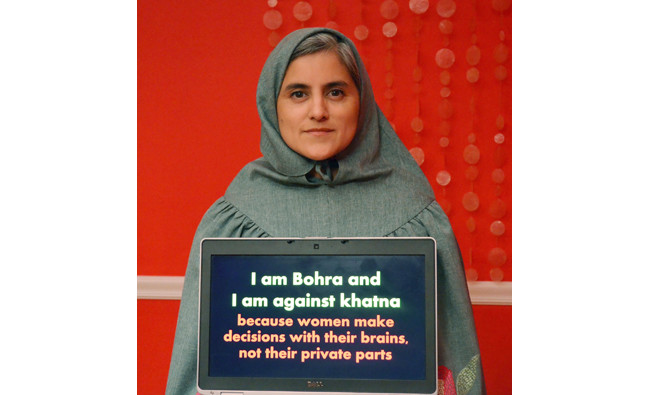
Finance firms urge ambitious action on plastic pollution

- Curtailing the estimated 400 million metric tonnes of waste produced every year is a crucial part of efforts to protect biodiversity, with microplastics found everywhere from the mountainous Himalayas to staple foods and even human blood
LONDON: A group of 160 financial companies on Friday urged governments to agree a treaty to end plastic pollution that would help spur private sector action, ahead of the next round of global talks in Canada.
The fourth meeting of the Intergovernmental Negotiating Committee on Plastic Pollution (INC-4) is due to be held in Ottawa next week to lay the groundwork for an eventual deal before the end of the year.
Curtailing the estimated 400 million metric tonnes of waste produced every year is a crucial part of efforts to protect biodiversity, with microplastics found everywhere from the mountainous Himalayas to staple foods and even human blood.
To help fix the problem, the finance firms, which include Britain’s biggest investor Legal & General Investment Management and Canadian pension investor CDPQ, called for a policy framework backed up by binding rules.
Among specific steps, the group called for the treaty to set an objective for all public and private finance to be consistent with the goal of eliminating plastic pollution, similar to that in the Paris climate agreement and the Kunming-Montreal global biodiversity framework.
It also called for companies to assess and disclose plastic-related risks and opportunities; clearer plastic-related policies and targets from governments in areas like waste creating and recycling; and for further private investment to be directed to ending plastic pollution.
“A clear transition pathway laid out in the Treaty will help leverage finance at scale for this massive task of ending plastic pollution worldwide,” said Anne-Sophie Castelnau, global head of sustainability at ING, one of the signatories.
Steve Hardman, CEO of Plastic Collective, an NGO which designed the world’s first plastic waste reduction bond alongside Citi and the World Bank, welcomed the support but called for business to provide more financial solutions.
In January, the World Bank issued the $100 million bond to finance plastic-reduction projects in Ghana and Indonesia. Investors will be paid a rate linked to plastic removal credits generated by the projects.
Finnish PM: EU should help end migrant influx from Russia

- European Commission President Ursula von der Leyen visits the border to assess security situation
HELSINKI: The EU should take measures to help Finland stop an influx of migrants via Russia, Finnish Prime Minister Petteri Orpo said.
Finland last year shut its long border with Russia amid a growing number of arrivals from countries including Syria and Somalia.
It accused Moscow of weaponizing migration against the Nordic nation and the EU, an assertion the Kremlin denies.
Finland’s government has closed eight of its nine checkpoints with Russia.
The only one that remains open is dedicated to rail travel and cargo trains mainly run through it.
“We are preparing our legislation, but we also need EU measures,” Orpo said, without elaborating, after visiting the Nordic country’s border with European Commission President Ursula von der Leyen.
Von der Leyen told the same press conference that the EU Commission was working closely with the migrants’ countries of origin, agreeing with Finland’s position.
“What we see is that a state is instrumentalizing poor people to put pressure on another state, so that is a clear security issue,” she said.
She said that the measures taken to deal with migrants from Russia must balance protecting the security of borders and international obligations.
Following Poland and Lithuania’s example on their borders with Belarus, the Finnish government is drafting legislation allowing border guards to block asylum seekers entering the country from Russia.
“We all know how (Russian President Vladimir) Putin and his allies instrumentalize migrants to test our defenses and to try to destabilize us,” von der Leyen told officials.
“Now Putin is focusing on Finland, and this is no doubt in response to your firm support of Ukraine and your accession to NATO.”
Von der Leyen and Orpo flew in a Finnish helicopter over the landscape of forests and towns on the border.
Von der Leyen is campaigning as a conservative European People’s Party bloc member for a second term in office as head of the EU’s powerful executive branch.
Security is a top EPP theme before the June 6-9 European Parliament elections.
Most of the migrants hail from the Middle East and Africa.
Most of them have sought asylum in Finland, a member of the EU and NATO with a population of 5.6 million.
Finland joined NATO in April 2023, ending decades of neutrality after the country’s defeat by the Soviet Union in the Second World War.
In March, Sweden also became a member of the trans-Atlantic alliance.
The move dealt a major blow to Putin, with a historic realignment of Europe’s post-Cold War security landscape triggered by Moscow’s offensive against Ukraine.
US sanctions ally of Israeli minister, entities backing ‘extremist’ settlers

- Move comes as West Bank sees some of its worst violence perpetrated by settlers against Palestinians since Gaza war
WASHINGTON: The United States on Friday imposed sanctions on an ally of Israel’s far-right national security minister and two entities that raised money for Israeli men accused of settler violence, the latest actions aimed against those Washington blames for an escalation of violence in the Israeli-occupied West Bank.
The sanctions, in addition to those already imposed on five settlers and two unauthorized outposts already this year, are the latest sign of growing US frustration with the policies of Israeli Prime Minister Benjamin Netanyahu.
The moves on Friday, which freeze any US assets held by those targeted and generally bar Americans from dealing with them, hit two organizations that launched fundraising campaigns to support settlers accused of violence and targeted by previous sanctions, the Department of the Treasury said in a statement.
The Biden administration’s moves against Israeli settlers have upset right-wing members of Netanyahu’s governing coalition who support the expansion of Jewish settlements and ultimately the annexation of the West Bank, where Palestinians envisage a future state.
They come as the complex relationship between Washington and its ally Israel is tested by the war in Gaza and as the Biden administration urges Israel to show restraint in responding to retaliatory strikes by Iran.
Washington sanctioned Ben-Zion Gopstein, founder and leader of the right-wing group Lehava, which opposes Jewish assimilation with non-Jews and agitates against Arabs in the name of religion and national security. Gopstein has said Lehava has 5,000 members.
State Department spokesperson Matthew Miller said members of the group had engaged in “destabilizing violence affecting the West Bank.”
“Under Gopstein’s leadership, Lehava and its members have been involved in acts or threats of violence against Palestinians, often targeting sensitive or volatile areas,” Miller said in a statement, warning of additional steps if Israel does not take measures to prevent extremist attacks amid an escalation of violence in the West Bank in recent days.
The European Union also said on Friday it had agreed to take sanctions against Lehava and other groups linked to violent settlers.
A spokesperson for Israel’s embassy in Washington did not immediately respond to a request for comment.
Gopstein, the most prominent Israeli figure targeted by US sanctions, is a close associate of and has family ties to National Security Minister Itamar Ben-Gvir, who himself lives in a West Bank settlement.
Ben-Gvir, like Gopstein, was a disciple of the late Meir Kahane, an ultranationalist rabbi whose Kach movement was listed by Washington as a specially designated global terrorist organization.
Ben-Gvir on Friday slammed what he called harassment against Lehava and “our dear settlers who have never engaged in terrorism or hurt anyone,” labeling the allegations against them a “blood libel” by Palestinian groups and anarchists.
“I call on Western countries to stop cooperating with these antisemites and end this campaign of persecution against the pioneering Zionist settlers,” Ben-Gvir said in a statement released by his office.
CROWDFUNDING
Since the 1967 Middle East war, Israel has occupied the West Bank of the Jordan River, which Palestinians want as the core of an independent state. It has built Jewish settlements there that most countries deem illegal. Israel disputes this and cites historical and Biblical ties to the land.
The Biden administration in February said settlements were inconsistent with international law, signaling a return to long-standing US policy on the issue that had been reversed by the previous administration of Donald Trump.
One entity targeted on Friday, Mount Hebron Fund, launched an online fundraising campaign that raised $140,000 for settler Yinon Levi, the Treasury said, after he was sanctioned on Feb. 1 for leading a group of settlers that assaulted Palestinian and Bedouin civilians, burned their fields and destroyed their property.
It said the second entity, Shlom Asiraich, raised $31,000 on a crowdfunding website for David Chai Chasdai, who the United States sanctioned for initiating and leading a riot that included setting vehicles and buildings on fire and causing damage to property in the Palestinian town of Hawara, resulting in the death of a Palestinian civilian.
“These types of enforcement actions against entities helping violent settlers evade US sanctions are what give sanctions teeth,” said Michael Schaeffer Omer-Man, director of research for Israel-Palestine at Democracy for the Arab World Now, a human rights group that has highlighted efforts by supporters to evade sanctions against settlers.
Hindu-Muslim divisions sway voting in Indian district scarred by deadly riots

- Villages are largely self-segregated by religion in and around Muzaffarnagar in the most populous Uttar Pradesh state
- Violent clashes broke out in 2013 after two Hindus stabbed Muslim youth to death, accusing him of harassing their sister
MUZAFFARNAGAR: Hindu-Muslim enmity made way for peace in an Indian district that saw deadly riots a decade ago but religious divisions still influence residents who voted on Friday in general elections in which Hindu nationalism is a key theme.
Villages are largely self-segregated by religion in and around Muzaffarnagar district, in the most populous northern state of Uttar Pradesh, but people say there is no longer tension between the majority Hindu and minority Muslim communities.
Violent clashes broke out here in 2013 after two Hindus stabbed a Muslim youth to death, accusing him of sexually harassing their sister. They were later beaten to death by a Muslim mob, which sparked riots that killed about 65 people, mostly Muslims, and displaced thousands.
Violence has not returned to the district known as the country's sugarcane-belt, but political divisions remain as Hindus typically vote for Prime Minister Narendra Modi's Bharatiya Janata Party (BJP) and Muslims for the opposition.
Modi's government has "controlled Muslims", said Ramesh Chand, a Hindu biscuit baker in Kairana city near Muzaffarnagar.
Critics accuse the nationalist BJP of targeting India's 200 million minority Muslims to please their hardline Hindu base - charges they deny.
Modi is widely expected to win a third term on the back of strong growth, welfare and his personal popularity despite some concern about unemployment, price rises and rural distress.
Chand said Modi had improved security in the region. "We can live in peace, whether or not we have jobs ... We can sleep with our doors open."
There were opposing views too.
In Jaula village, sugarcane farmer Mohammed Irfan, 50, said Modi's "high-handedness against Muslims" as well as unemployment and inflation were major reasons for him voting for the opposition Samajwadi Party.
Uttar Pradesh elects 80 lawmakers to the 543-member lower house of parliament, the most among all states, and a strong showing here is critical to the nationwide outcome.
Support for Modi was visible in Kutba Kutbi village, the epicentre of the 2013 riots.
Although there is "brotherhood" between the two communities now, nearly all Muslim families left the village after the riots, said Vinay Kumar Baliyan, 43, a farmer who said he supports Modi for promoting economic growth and raising India's stature globally.
But Irfan said Muslims are expected to vote in larger numbers this time as Eid celebrations this month brought many migrant workers and students home.
After Pakistan alert, WHO likely to issue wider warning on contaminated J&J cough syrup

- The UN health body said it puts out global medical product alerts to ‘encourage diligence’ by authorities
- The WHO this week sent out alert on five batches of contaminated cough syrup ingredients found in Pakistan
LONDON: The World Health Organization is likely to issue a wider warning about contaminated Johnson and Johnson-made children’s cough syrup found in Nigeria last week, it said in an email.
Nigeria’s regulator recalled a batch of Benylin paediatric syrup last Wednesday, having found a high level of diethylene glycol in the product during routine testing.
The contaminant, alongside another closely related toxin, ethylene glycol, has been linked to the deaths of more than 300 children in Cameroon, Gambia, Indonesia and Uzbekistan since 2022, though there is no evidence that these incidents are linked with the latest recalls.
The UN health body said it puts out global medical product alerts to “encourage diligence” by national authorities and was likely to do so in this instance, “subject to confirmation of certain details from parties.”
The recalled batch of Benylin syrup was made by J&J in South Africa in May 2021, although Kenvue now owns the brand after a spin-off from J&J last year.
J&J has referred requests for comment to Kenvue. In an emailed statement on Friday, Kenvue said it had carried out tests on the batch recalled by Nigeria and had not detected either diethylene or ethylene glycol.
“We continue to work closely with health authorities and the WHO and are engaging with NAFDAC to understand their test results, including verifying the authenticity of the sampled product, the testing methodology used, and results reported by the agency,” the statement added.
Since Nigeria’s recall, five other African countries have also pulled the product from shelves — Kenya, Rwanda, Tanzania, Zimbabwe and South Africa, where the drug was made.
South Africa’s regulator has also recalled another batch of the syrup, which is used to treat coughs, hay fever and other allergic reactions in children.
Diethylene glycol is toxic to humans when consumed and can result in acute kidney failure, although there have been no reports of harm in the latest incident.
RAW MATERIALS
In the 2022 cases, the contamination in the syrups came from the raw materials used by manufacturers in India and Indonesia.
The WHO said it was collaborating with both the manufacturer and regulatory authority in South Africa to investigate the Benylin paediatric syrup, and had information on the source of the ingredients used. Kenvue has previously said it tested its ingredients before manufacture.
The agency said the possibility that the syrup was counterfeit was also “under consideration as part of investigations.”
Earlier this week the WHO sent out a separate alert on five batches of contaminated cough syrup ingredients found in Pakistan that appeared to have been falsely labelled as Dow Chemical products.
It was the first alert the WHO has sent on excipients — elements of a medicine other than the active pharmaceutical ingredient — rather than finished products, the agency confirmed on Friday.
The batches of propylene glycol were contaminated with ethylene glycol.
“It was critical for WHO to also alert manufacturers that may have been procuring this material to exercise more caution,” a WHO spokesperson said by email.
Propylene glycol is not an ingredient in Benylin paediatric syrup, a Kenvue spokesperson said on Friday.


